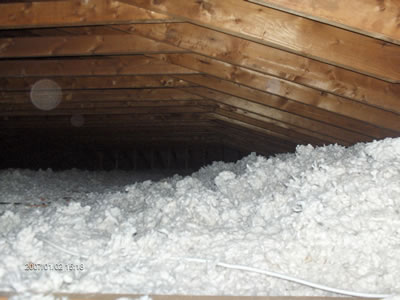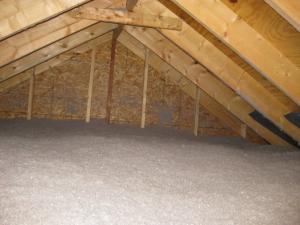You can also measure the height of the insulation and multiply times the r value per inch of the ma terial that is in place 2 5 to 4 0 per inch on average.
Attic insulaation markers must be applied every.
Inspecting attic insulation there are several factors to consider when inspecting loose fill blown in attic insulation.
Now that you ve air sealed your attic and basement check your attic insulation levels and add more if necessary.
A finished attic should be insulated much like the rest of the house with insulation in the walls and ceiling.
Installing new hvac equipment b.
Adding extra insulation in the attic.
Air sealing gaps d.
Markers shall be provided for every 300 square feet of attic area attached to the trusses rafters or joists and indicate in 1 inch high numbers the installed thickness of the insulation.
With a finished attic insulation must help keep the attic areas comfortable.
Other insulation marking details can be found in the.
1 percentages of recycled content.
Air seal ceiling plane and and install attic floor insulation as described in steps 5 and 7 above.
Ensure you use a foam sealant to seal and insulate around any attic windows.
These include the type depth and density of the insulation.
Fiberglass or other mineral fiber insulation must cover the ccspf by at least 1 5 inches unless the foam is rated for exposure in attics or a separate ignition barrier is applied.
How to insulate a finished attic.
Blown or sprayed roof ceiling insulation thickness must be written in inches on markers at least one every 300 square feet through the attic space in letters one inch high facing the attic access opening.
Sloping the ground toward the structure c.
Brands like atticat insulation can be blown in with the proper machinery and when they re applied this way the insulation doesn t settle ensuring consistent and long lasting insulation for years to come.
Insulation must be installed so that the manufacturer s r value mark is readily visable.
Increasing attic insulation to an r 50 can provide a good barrier to heat loss.
Alternatively you could use loosefill insulation instead of laying down batting.
Effective moisture control in areas throughout a home must also include in the structure and not just by the use of a vapor diffusion retarder.
In general an attic s r value should be between r 30 and r 49.
The attic is the easiest place to add insulation to improve your comfort and the energy efficiency of your home.
Your home s r value score will guide you toward the type of insulation you need.
In particularly cold climates you might go up to r 60.
Upgrading the windows e.
To determine the present r value of your attic insulation have an energy assessment.










